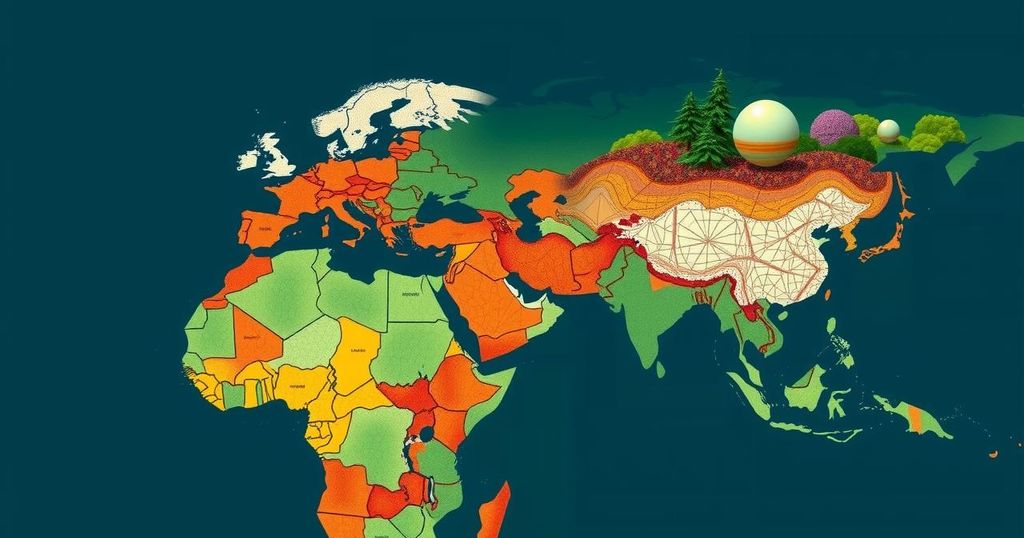Wealthier nations are beginning to provide financial compensation to poorer countries suffering from climate change disasters, exemplified by a pilot program in Malawi after Cyclone Freddy’s destruction. Funded primarily by the Scottish government, the program aims to support rebuilding efforts for affected individuals. Experts warn that existing pledges may fall short as the need for climate-related funding escalates due to increasingly severe weather events and their financial burdens on developing nations.
In the aftermath of Cyclone Freddy, which devastated southern Malawi in 2023, many residents faced severe hardships, including Christopher Bingala, a subsistence farmer who lost his home and livestock. Fortunately, Bingala received a payment of approximately $750, part of a pioneering compensation initiative for climate-related disaster damages known as “loss and damage” funding. This financial assistance is essential for low-income countries that contribute minimally to global emissions yet suffer greatly from climate change effects. So far, roughly $720 million has been pledged by wealthier nations to address these damages, despite experts warning that this amount may not suffice amid escalating climate disasters.
At the COP29 climate summit held in Baku, Azerbaijan, negotiations are underway regarding the distribution of funds to developing nations as part of a broader climate finance strategy. The financial aid aims to help nations grappling with worsening storms and droughts, driven largely by global emissions. “We just hope that the global north and the nations whose economy is fueled by the emissions – they come to the plate and take up their responsibility to look at what they’re causing us,” stated Philip Davis, Prime Minister of the Commonwealth of the Bahamas.
Cyclone Freddy’s destruction led to the displacement of approximately 650,000 individuals in Malawi, with many families, including Bingala’s, losing their homes and desperately searching for food. Upon receiving the cash payment, Bingala was able to relocate to a less flood-prone area, where he is now rebuilding his life and striving to enhance his family’s well-being.
The funding Bingala received originated from the Scottish government, noted for being the first to allocate resources specifically for loss and damage. Humanitarian groups, such as GiveDirectly, have facilitated the distribution of these funds to affected individuals, enabling them to rebuild their homes, invest in agriculture, or pay for education. “Low-income households in low-income countries have far less protections from extreme events,” emphasized Yolande Wright, Vice President of Partnerships at GiveDirectly.
The current pilot program in Malawi serves as a prototype for a larger system to compensate low-income nations for climate-related losses. Increasingly severe weather events are placing significant financial strain on these countries, many of which are already grappling with debt. As Prime Minister Davis explained, the economic repercussions of climate disasters, exemplified by Hurricane Dorian, have led to substantial national debt increases. The dire need for sustainable funding mechanisms is highlighted by projections that loss and damage-related costs could soar to $250 billion annually by 2030.
In conclusion, as nations negotiate the intricacies of climate compensation, the onus remains on wealthier countries to fulfill their obligations in supporting vulnerable populations facing unprecedented climatic challenges. The importance of not only recovery after disasters but also preventive measures, such as relocating communities at risk, cannot be overstated. As these discussions progress, the global community must confront the reality that the effects of climate change are far-reaching and will affect all nations if left unaddressed.
The issue of climate change disproportionately impacts low-income countries, which, despite contributing minimally to global greenhouse gas emissions, suffer the most from the resulting disasters. Recent agreements, particularly at international climate summits, have focused on establishing funds to compensate these nations for the damages incurred due to climate-induced occurrences. This funding, known as “loss and damage” compensation, aims to provide financial relief for recovery efforts and promote resilience against future climatic events.
The negotiations at the COP29 climate summit are crucial in determining the future financial strategies to support low-income countries suffering from climate change-induced disasters. The initiatives, such as loss and damage funding, highlight the urgent need for wealthy nations to acknowledge and address their responsibility in contributing to climate resilience globally. To avoid worsening humanitarian crises, collaborative efforts must be enhanced to ensure that comprehensive funding reaches those in dire need and is used not only for recovery but also for preventive measures.
Original Source: www.upr.org






